‘He Died as a Prince’: Erskine Childers: Executed November 1922
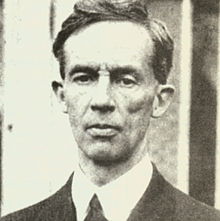
By John Dorney
Erskine Childers was executed by the Irish Free State, 100 years ago this November, in Dublin’s Beggar’s Bush Barracks. An urbane intellectual but also military man and skilled propagandist, his life’s journey defies easy explanations.
He journeyed from a Protestant unionist background, having served the British Empire in two wars, to Home Ruler and finally dying as an irreconcilable Irish republican, hated by those who founded the Irish Free State.
Early life
Childers came from a landed, Protestant family based in County Wicklow. Closely related, both in blood and in sympathies was his first cousin and lifelong dear friend Robert Barton whose family, had their estate at Annamoe in the heart of the Wicklow Mountains. The fate of the two would be closely intertwined. Childers himself was born in London, but largely grew up with the Bartons in Wicklow, after his own parents died when he was young. In the 19th century, the politics of both the Childers and Barton families were firmly unionist and Imperialist.
Indeed Robert Barton recalled that his father Charles William Barton, regarded fellow Wicklow landowner Charles Stewart Parnell as a traitor to his class and community for leading the Home Rule Party. Charles William according to Robert Barton, ‘was a loyal supporter of the British administration here. He and Parnell were great friends but, when Parnell joined the national Party, he never spoke to him again.’[1]
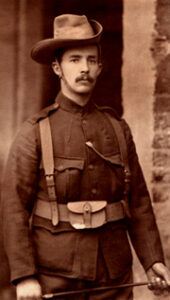
The family had served in many British wars, including the Zulu war in South Africa. It is therefore not surprising that Erskine Childers as a young man served in British Army in Boer War, following family tradition. In fact, after an education in England, he temporarily left his job as Clerk of House of Commons to join a Volunteer Horse Artillery unit in South Africa.
His famous novel, for which he became a household name at the time, ‘The Riddle of the Sands’ (1903) is a patriotic spy novel about a German plot to invade England, foiled by two young sailing enthusiasts. He followed up its success with a history of the Boer War and a treatise on the future of cavalry in warfare, both of which were well received in establishment circles.[2]
Nevertheless, by the 1900s, he and his cousin Robert Barton both became supporters of Home Rule and Irish self government. Childers used his pen for the cause, writing a pamphlet, a ‘A Framework for Home Rule’, which argued the case for making Ireland a Dominion like Canada or Australia. This may have been consistent with a type of ‘Empire patriotism’ but both Childers and Barton were to take their new nationalist sympathies much further.
Childers became increasingly disgusted with the blocking of Home Rule by the Ulster Unionists, who raised and armed a militia, the Ulster Volunteers to resist it in 1913. Both Childers and Barton subsequently joined the nationalist militia the Irish Volunteers, after it was formed in response to the Ulster Volunteers, serving under Colonel Maurice Moore, like them, a man of Anglo-Irish background but nationalist convictions.
Childers served the British Empire in the Boer War and the First World War but also helped to smuggle gun to the Irish Volunteers in 1914.
They also helped to arm the Volunteers. Childers and his wife Mollie were central to the Howth gun running in 1914 in which over 1,000 German rifles were landed for the nationalist militia the Irish Volunteers aboard Childers’ yacht the Asgard.
This did not stop Childers however, from enlisting in the British forces during the First World War. He served in the Royal Navy and from 1916 occupied a senior position in the Admiralty and finally in new Royal Air Force, where he helped to plan a prospective bombing campaign on Germany. Winston Churchill, then Lord of the Admiralty, praised him as ‘a man of ‘distinction, ability and courage’.[3]
How Childers could reconcile his Irish nationalist convictions with half a lifetime spent serving the British Empire is an interesting question. But certainly by 1918 he was reiterating his calls for ‘Dominion Home Rule’, which was considerably more than had been put on offer in the Home Rule Bill 1912 and far more than the British government was prepared to concede in the wake of the Great War. Childers vented his ‘blind fury’ at those English official he met in the postwar period; ‘these cultured, cold-blooded, self-satisfied people making a living out of the exploitation of humanity’. [4]
What precisely it was that caused Childers to break so utterly with his unionist background and history of service to the British empire at this point remains a matter of speculation to some extent.
Republican propagandist
In 1917-18 he acted as Secretary to Irish Convention, essentially the last attempt by the British government to secure a consensus agreement on Home Rule. Its failure (Sinn Fein, the rising separatist party, did not attend and the Ulster Unionists would broach no concessions) seems to have influenced Childers greatly. Certainly, after this point he appears to have became a committed Irish separatist.
After Sinn Fein’s victory in 1918 general election (in which his cousin Robert Barton had been elected as MP for Wicklow), Childers offered his services to First Dail and the rebel government they set up in January 1919. He moved his family from London to Dublin became deputy head of Republican propaganda, under Desmond Fitzgerald. When the latter was arrested in February 1921, Childers was promoted to head of Propaganda and became editor of the Republican newspaper ‘The Irish Bulletin.’ He also wrote pieces for newspapers in Britain and America highlighting British repression in Ireland.
Childers also served in the Republican Land Bank and as a judge in the republican Courts and was elected as Sinn Fein TD for the Second Dail in May 1921. By this time he had grown close to Eamon de Valera, but was highly distrusted by Sinn Fein founder Arthur Griffith, who was suspicious of his background in British intelligence. Griffith, who had never wanted him as part of the movement in Ireland, initially had sent Childers as an ambassador to the Paris peace conference where Griffith thought he would be safely out of the way.[5]
Childers volunteered his service to the Republican movement in 1919 but was also distrusted by Arthur Griffith
Interestingly though, the animosity went both ways. Childers blamed Griffith for the timid note struck by the Irish Bulletin newspaper up until the time he (Childers) took it over in early 1921. The Bulletin hitherto had documented British reprisals in Ireland but not the IRA campaign against it. Childers wrote; ‘nothing struck me more … than the failure of the political side to take responsibility for the Army and its work…it was only by insisting on its waging a legitimate war of national defence…[that] one could meet the torrent of defamation’.[6] He blamed Griffith, who had reservations about the use of armed force, for ‘this curb on propaganda’.[7]
Childers was briefly arrested in May 1921 by Crown forces, but for reasons that are not entirely clear, released shortly afterwards.
The Treaty
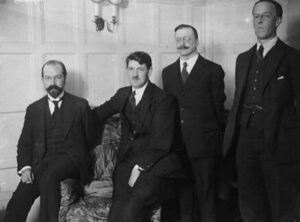
On the insistence of Eamon de Valera and much to Arthur Griffith’s dismay, Childers acted as Secretary to the Irish negotiators in the Treaty talks in late 1921, while his cousin Robert Barton was one of the plenipotentiaries.
Childers was adamantly against the clauses in the Treaty which gave the British naval bases in the Irish Free State and which committed the Irish Free State to joining future British wars. He had long and heated arguments with Winston Churchill (for whom he had once worked in the admiralty) about naval affairs, leading to Churchill developing intense antagonism towards him.[8]
Nor did he have an amicable relationship with the leading Irish negotiators, Michael Collins and Arthur Griffith, who viewed him as an impediment to securing a settlement. Childers drafted a memorandum along with George Gavan Duffy and Robert Barton rejecting a draft agreement agreed by Griffith, on both defense grounds (that is regarding control over Ireland’s ports) but also because Childers was convinced that if Ireland remained inside the British Empire as opposed to having ‘external association’ with it, Ireland would never be truly independent.[9]
Childers was adamant that the Treaty did not represent the achievement of Irish independence.
Childers as secretary was not a signatory to the Treaty, which was concluded on December 6 1921 but which he was against signing. His cousin Robert Barton did sign however, but only after, he maintained, Prime Minister Lloyd George’s final threat of war.
Childers was to argue fervently that the Treaty did not represent Irish independence or even a path towards it. In the Treaty debates in the Dail, he argued that the Treaty meant ‘deliberately abandoning independence’ and disputed that it even gave Dominion status in the same manner as Canada.
The Irish state would not control it coasts or have any choice as to whether to enter war on Britain’s behalf. Childers argued; ‘Canada has a real and genuine share in the decision of those great questions of foreign policy, and on peace and war upon which the destiny of a nation depends. Ireland under this Treaty will have none.’
His references to Griffith and Collins were oblique but cutting. Referring to them as the ‘Minister for Foreign Affairs and the Minister for Finance, he said that they were asking the Dail ‘to vote for its own extinction’. [10]
Childers himself became a particular hate figure on the pro-Treaty side. This was particularly pronounced on the part of Arthur Griffith, who called him ‘a damned Englishman’ and refused to answer questions from him. In part this was the culmination of long held animosity towards a man he had regarded as untrustworthy from the start and now accused of being a British agent. Similarly, Michael Collins, in a fit of anger after being taunted by Constance Markiewicz as an ‘oath breaker and coward’ damned the anti-Treatyites as ‘Foreigners! Americans, English!’ in reference to the birthplaces of Eamon de Valera and Erskine Childers. [11]
Civil War
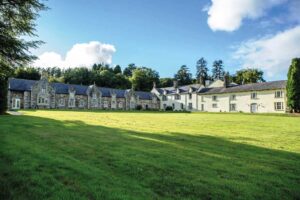
Childers was not a member of the IRA and fell into the background as the guerrilla army split in early 1922. It was they rather than Childers and Eamon de Valera who would come to dominate the anti-Treaty cause, occupying the Four Courts in central Dublin in April 1922. Childers lost his seat in the June 1922 general election, in which the pro-Treaty parties achieved a majority.
When Civil War did break out however in late June 1922 with the Provisional Government’s attack on the Four Courts, Childers again offered his services to the republican cause. He again became the head of republican propaganda, operating out of republican-held Cork, where for a time he edited the Cork Examiner as well as the republican paper Poblacht na hEireann.
Anthony Barrett lays out in this article his activities during the Civil War. Suffice to say, though, that Childers and his team were ousted from place to place in the hills of West Cork after the pro-Treaty troops seized Cork city. Among those who worked for him were future novelists and short story writers Frank O’Connor and Sean O’Faolain. They speak in their memoirs of Childers as being greatly distressed by the Civil War and despondent about republican prospects.
During the Civil War Childers again served as head of Republican propaganda
In early November 1922, Childers made his way back to county Wicklow and was arrested at the family home at Annamoe Co Wicklow on November 10, along with another cousin, David Robinson, who had become an IRA officer. Childers had been blamed in the pro-Treaty press for leading the IRA guerrilla campaign (which he certainly was not) and for the anti-Treatyites’ destruction of the railways. He was also captured in possession of a small hand gun.
By this time, his long-time foe Arthur Griffith was dead (having died of a stroke on August 12), as was Michael Collins (killed in a gun battle in Cork on August 22). But it is clear there was still much personal animosity against Childers.
Execution
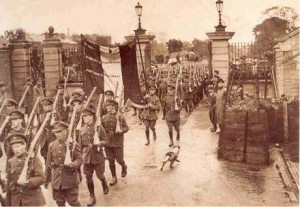
In September 1922, the Third Dail had passed a resolution allowing for the execution of those bearing arms against the state; the so-called Public Safety Act.
And so, on November 20, 1922 Childers was sentenced to death by a military court. This was highly dubious legally for many reasons. Childers’ legal team, led by Michael Comyn, argued that as a civilian he could not be tried by military courts. But the High Court of the Free State ruled that the country was in state of war. While Childers’ legal team was preparing an appeal, he was executed, the fifth man to die in front of the Free State firing Squads, 81 in total would be judicially executed by the end of the war.
The Government put the execution in the hands of Paddy O’Connor, one of their most trusted National Army officers. He was a veteran of the pre-Truce Dublin IRA Active Service Unit, had been among the first Dublin Guard unit who took over Beggars Bush and had led the assault parties on the Four Courts and on O’Connell Street in the first week of the Civil War.
Childers was executed in Beggars Bush Barracks on November 24, 1922
Shooting a prisoner in cold blood was a gruesome and traumatic task. The pro-Treaty authorities were worried at first that troops would refuse to carry out the executions and ‘a squad of the best unit in Dublin’ was selected for the first firing squads.’[12] According to one officer, ‘they were Irishmen who were in the British Army [in the First World War] .’ The firing squad was issued fifteen rounds but only five were live, meaning no one soldier would know whether or not he had fired a fatal shot. Childers asked O’Connor not to cover his eyes, but O’Connor insisted, ‘to spare the men’.[13] Childers was shot by firing squad in Beggars Bush Barracks on 24 November 1922.
Why Childers was singled out for execution remains somewhat obscure. It may have been as message to terrorise senior anti-Treaty leaders. But much more militant IRA leaders such as Ernie O’Malley, commander of the IRA’s Eastern Division, who was captured just five days before Childers, were not shot. O’Malley had not only been armed with a rifle, handgun and grenades when he was captured but had also shot several National Army soldiers during the ensuing gun battle, killing one and injuring more.
Childers sentence may also though, have been due to his English birth and to the fierce animosity that many on the pro-Treaty side held towards him. Ernie O’Malley, lying wounded in a military hospital with convalescing Free State soldiers, found that they hated Childers, ‘he was a damned English spy and had always been a spy. Arthur Griffith’s bitter words carried weight from a man who had seldom stooped to abuse’.[14]
It may also have been significant that Winston Churchill and senior figures in the British despised him as a ‘murderous renegade’. Churchill said upon his capture that Childers bore a ‘deadly and malignant hatred for the land of his birth [England].[15]
Eamon de Valera, Childers’ close political ally, lamented his death; ‘he died the prince that he was. Of all the men I ever met I would say he was the noblest’. ‘The gun he had in his possession was an automatic that Mick [Collins] gave him, telling hit was to defend the Republic.’[16]
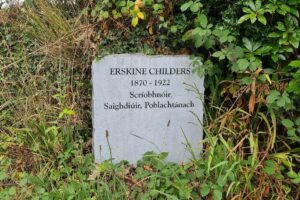 Childers in his final letters declared that he still loved both Ireland and England.[17] There are a myriad of ironies that he went to this death as republican martyr at the hands of an Irish nationalist government. He urged his family to forgive those who executed him.
Childers in his final letters declared that he still loved both Ireland and England.[17] There are a myriad of ironies that he went to this death as republican martyr at the hands of an Irish nationalist government. He urged his family to forgive those who executed him.
The Irish Times, a former Unionist paper and now supporter of the Free State, argued for the necessity of executions but opined that, ‘every generous mind will deplore the irony of fortune that drove a scholar, a soldier and gentleman into fatal conflict with his own country’s greatest act of reconciliation [the Treaty]’.[18]
His son, also Erskine Childers became a Fianna Fail TD, served as a minister in several governments in 1950s & 60s and also as Tainiste before finally serving as President of Ireland. He died in office in 1973.
If you enjoy the Irish Story and wish to support our work, please consider contributing at our Patreon page here.
References
[1] Robert Barton BMH statement WS 0979
[2] Frank Packenham, Peace by Ordeal the Negotiation of the Anglo-Irish Treaty, London, 1972, p..85
[3] Packenham, p.86
[4] Charles Townshend, The Republic, the Fight for Irish Independence, Allen Lane, London, 2013, p.95
[5] Packenham, p87
[6] Ian Kenneally, the Paper Wall, Newspapers and Propaganda in Ireland 1919-21, Collins Press, Cork, 2008, p. 72
[7] Townshend, The Republic. P.96
[8] Childers insistence in this regard is noted in T. Ryle Dwyer, Michael Collins and the Treaty, Mercier, Cork, 1981, p.58-61
[9] See Packenham, Peace by Ordeal, p. 188-91, 199-201.
[10] [10] See Dail debates 19/12/1921 https://www.oireachtas.ie/en/debates/debate/dail/1921-12-19/2/#spk_29
[11] See Irish Story article on the Treaty debates here: https://www.theirishstory.com/2022/01/08/the-treaty-debates-december-14-1921-january-7-1922/#.Y4JP43bP3IU
[12] MacMahon testimony to Army Inquiry, April 1924, Mulcahy Papers UCD P/7C/14.
[13] Cited in Diarmuid O’Connor & Frank Connolly, Sleep Soldier Sleep, the life and times of Padraig O’Connor, Miseab, Dublin, 2011 pp. 128–30.
[14] Erine O’Malley, the Singin Flame, Anvil, Dublin 1992, p.193
[15] Packenham, p.271
[16] De Valera to Joe McGarrity, UCA Archie P150/1195
[17] Packenham p.271
[18] Irish Times, November 25, 1922